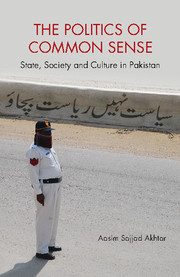Book contents
- Frontmatter
- Dedication
- Contents
- Preface
- Acknowledgments
- 1 Introduction
- 2 The Structure of Power ‘From Above’
- 3 Accumulation in Practice
- 4 The Many Faces of Islam
- 5 The Nation that Never Became
- 6 The Subordinate Classes: Beyond Common Sense?
- 7 Epilogue: What does a Counter-hegemonic Politics Look Like?
- Glossary
- Bibliography
- Index
4 - The Many Faces of Islam
Published online by Cambridge University Press: 05 July 2018
- Frontmatter
- Dedication
- Contents
- Preface
- Acknowledgments
- 1 Introduction
- 2 The Structure of Power ‘From Above’
- 3 Accumulation in Practice
- 4 The Many Faces of Islam
- 5 The Nation that Never Became
- 6 The Subordinate Classes: Beyond Common Sense?
- 7 Epilogue: What does a Counter-hegemonic Politics Look Like?
- Glossary
- Bibliography
- Index
Summary
Pakistan is like Israel, an ideological state. Take out Judaism from Israel and it will collapse like a house of cards. Take Islam out of Pakistan and make it a secular state; it would collapse.
Modern nationalism has many variants, but Pakistan is in unique company, being one of only two countries in which religious identity is the basis of membership in the political community. The myth of a monolithic Pakistani nation united by the bonds of Islam was totally exposed by the successful secession of more than half the population of the country in 1971. Yet, instead of acknowledging the glaring holes in the official nation-building project, the state and propertied classes proceeded to reassert Pakistan's ‘Islamic’ essence ever more vigorously.
In no uncertain terms, the instrumentalization of Islam has been a defining feature of Pakistan's political economy, particularly from the time that Zia-ul- Haq came to power. In this chapter, I will detail how religion has shaped the body-politic, and demonstrate that it is constitutive of common sense politics.
Various religio-political forces have come to exercise inf luence in the social and political mainstream and thereby been integrated into the structure of power over time. The religious right played a crucial role in undermining the radical political environment of the 1960s and 1970s, and it was subsequently rewarded by the Zia regime. The right's inf luence has increased in the subsequent period as attendant economic, political and cultural developments have proceeded apace.
Religio-political forces of both the parliamentary and militant variety now espouse a politics of resistance in lieu of the secular-left ideology that was more inf luential through the Bhutto period. This idiom of Islam as the language of the oppressed has been given impetus by the changed global environment since 9/11, and the growing perception that western powers – and client states in Muslim countries – are attacking ‘Islam’ in the name of democracy and human rights.
The claim that it is the fountainhead of popular resistance aside, the religious right's politics has not represented an affront to the everyday patronage regime in Pakistan. The Zia regime's policy of ‘Islamization’ gained at least superficial acceptance ‘from below’ both because of fear of the coercive apparatus of the state and because ‘Islam’ became an avenue for upward mobility in a society ravaged by inequality and injustice.
- Type
- Chapter
- Information
- The Politics of Common SenseState, Society and Culture in Pakistan, pp. 94 - 115Publisher: Cambridge University PressPrint publication year: 2017



